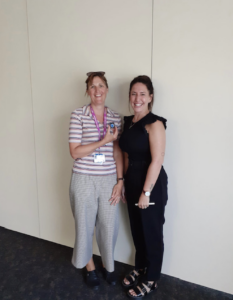
 In this week’s blog, Kate Wales (@Katewales20) and Emma Dillon (@EmmaDillonMH) share their thoughts on the experience of the Professional Nurse Advocate (PNA) journey as a PNA graduate and PNA module leader. Kate works as a National PNA and Supervision Lead for The Practice Plus Group and Emma is a senior lecturer at University of Northampton and member of the national PNA expert reference group.
In this week’s blog, Kate Wales (@Katewales20) and Emma Dillon (@EmmaDillonMH) share their thoughts on the experience of the Professional Nurse Advocate (PNA) journey as a PNA graduate and PNA module leader. Kate works as a National PNA and Supervision Lead for The Practice Plus Group and Emma is a senior lecturer at University of Northampton and member of the national PNA expert reference group.
The Professional Nurse Advocate (PNA) role was launched by NHS England in 2021. The Chief Nursing Officer Ruth May highlighted the need for nurses to be equipped to understand the demands of their role and how colleagues may be feeling, developing skills of leadership, quality improvement and to embed robust Restorative Clinical Supervision (RCS) within healthcare. Based on the Professional Midwifery Advocate (PMA) and underpinned by the AEQUIP framework (1) providing a much needed structure to really focus and support the wellbeing of nurses, compassionate work cultures and enabling quality care, purposeful education and psychological safety with (RCS) underpinning the PNA role.
The impact on nurses physical and emotional wellbeing has been discussed for many years with ad-hoc pockets of good practice to provide authentic and sustainable interventions which support and enable nurses to genuinely be able to recognise and care for themselves to provide effective care to others. Evidence indicates that when nurses experience poor wellbeing it can impact on the quality of care delivered and increase the risks of nurses experiencing moral injury (2). The need to feel a sense of belonging, to be cared for and to care for our colleagues increases feelings of being valued, respected and supported, encouraging positive wellbeing (3).
To enable those completing the PNA course to gain maximum personal and professional development, it is essential to that they feel supported and have a safe space to be able to reflect, restore and develop their own self-care strategy to then be able to facilitate authentic leadership, education and RCS to others all underpinned by compassion and curiosity. Nurses need to feel supported to do the right thing, to have a voice and a supportive culture to maintain their wellbeing (4).
Kate’s PNA journey
I knew when I started on the PNA course at the University of Northampton I wanted to be part of a culture that recognises and respects our staff’s mental and physical needs understanding that over the past year our healthcare teams have had to adapt to changing environments and new ways of working. The resilience of our teams has been tested to the limit because of the coronavirus pandemic. I wanted to develop a culture where staff say it is “my right to have supervision”!
I studied at Northampton University in June 2021 where I had a very positive experience undertaking the PNA course. The course covered leadership, quality improvement, self-care, mindfulness, personal and professional resilience and supporting staff wellbeing.
The course allowed me to focus on the wellbeing of our staff and highlighted the importance of reflective practice and supporting staff through Restorative Clinical Supervision. For one example, I have established wellbeing forums for our Health in Justice (HiJ) PNA’s to ensure they are safe, looking after their mental health and are able to learn from one another.
Undertaking the course equipped me with the skills and knowledge for supporting the implementation of RCS and enabled me to realise that the historic way of a very much hierarchical and prescriptive way of delivering clinical supervision needed to be revitalised and refreshed within my own organisation to enable a culture of continuous improvement.
From my own experience I understand the importance of compassion, self-care and kindness and how important it is to value our staffs’ wellbeing to engage and empower them to enable us to care for our patients more safely.
Staff working with HiJ are exposed to such emotionally challenging situations and often there are high levels of emotional labour and compassion fatigue. Therefore, there is the need for effective clinical leadership to advocate and support staff from the trauma and challenges they face on a daily basis. Restorative Clinical Supervision is the only trauma informed model of supervision that enables and empowers personal growth and development through a way of personal reflection and restoration (5).
Within HIJ there is often high levels of sickness in the workforce and day-to-day demands of the clinical environment have meant healthcare teams tend to prioritise the demands of the service over their need for ongoing reflection and support for wellbeing often resulting in high levels of burnout (6). We often find within the nursing field, Clinical Supervision is often one of the first things to be dropped when there are low staffing levels, or the demands of the service require. As part of the PNA role and with my experience I felt the most significant value I could offer would be providing a safe and reflective space for staff working at all levels to restore themselves and reflect upon the daily challenges staff are exposed to.
In May 2022 I was seconded into a National Supervision and PNA Lead role within HIJ, with a project aim was to embed positive supervision cultures across the organisation and the role of the PNA. My vision was to create a multi-professional framework that was underpinned by the restorative approach which allowed for flexibility and ad hoc opportunities to accessing supervision, with the understanding that the time to attend the sessions is always very difficult to protect and the noisy environment is often difficult when providing a safe space for reflection. This was not to say that there is the need at times for prescriptive, structured supervision sessions across HiJ but a recognition that the model could be flexible in its approach. It was important to acknowledge that the model proposed was multi professional (including registered staff, non-registered staff and allied health professionals) so there was opportunity for shared understanding of each other roles.
As part of the project roll out, I carried out a baseline survey and focus groups to establish what the barriers and facilitators were of effective clinical supervision. To no surprise the key themes highlighted were time, resources, access to a skilled supervisor and confidentiality albeit the majority of staff reported they valued supervision. I quickly understood that restorative clinical supervision would be a culture change for some individuals within the organisation, and a need for positive psychology and compassionate leadership to enable implementation. Resources including posters and leaflets were developed and shared amongst all sites to raise awareness and the profile of the existing PNAs and the model of RCS I was trying to implement. Awareness sessions were delivered throughout July and August by me encouraging staff to attend to talk about Clinical Supervision and the purpose of the PNA. A gap analysis was carried out to establish current service provision and needs to support the implementation.
Personally, to be able to effectively implement the PNA role there had to be operational and strategic ‘buy in’ from my organisation. Meeting with key persons within my organisation including the Director of Nursing and Quality to look at how the PNA role could be implemented across the organisation and ways in which we could support colleagues to build upon the role and build support forums to enable staff to engage within the process was essential.
Excitingly we have now established a monthly PNA network with the 20 of our trained PNAs and held our first ‘Community of Practice’ Meeting which enabled us to plan for the future within HiJ. We have 37 aspirational PNAs on the next cohort of the PNA programme which is really exciting!
I am now working with the Foundation of Nursing Studies to develop a Train the Trainer/Champion model of Resilience Based/Restorative Clinical supervision which will be rolled out across Health in Justice.
Summary
Kate’s journey is a great example of how powerful the PNA role can be for nurses, nursing students and other members of the health care team. We have to really invest in ourselves, each other and those around us to really embedded genuine wellbeing cultures which will enable QI/ leadership, education, patient care to flourish.
Check out the PNA Website.
References
- Capito C et al(2022) Professional midwifery advocates: delivering restorative clinical supervision. Nursing Times [online]; 118: 2, 26-28.
- The Society of Occupational Medicine (2020) The Mental Health and Wellbeing of Nurses and Midwives in the United Kingdom: https://www.som.org.uk/sites/som.org.uk/files/The_Mental_Health_and_Wellbeing_of_Nurses_and_Midwives_in_the_United_Kingdom.pdf
- The Kings Fund (2020) The Courage of Compassion: https://hsruk.org/hsruk/publication/kings-fund-courage-compassion-supporting-nurses-and-midwives-deliver-high-quality
- Royal College of Nursing (2020) Wellbeing. Psychological Safety: https://protect-eu.mimecast.com/s/pKdMC5l9YIMDKJwszmOYO?domain=rcn.org.uk
- Wallbank (S) (2016) The Restorative Resilience Model of Supervision, Vol 1. 1st ed. Hove: Pavilion.
- Rouse S (2019) The role of the PMA and barriers to the successful implementation of restorative clinical supervision. British Journal of Midwifery. Vol 27 (6)